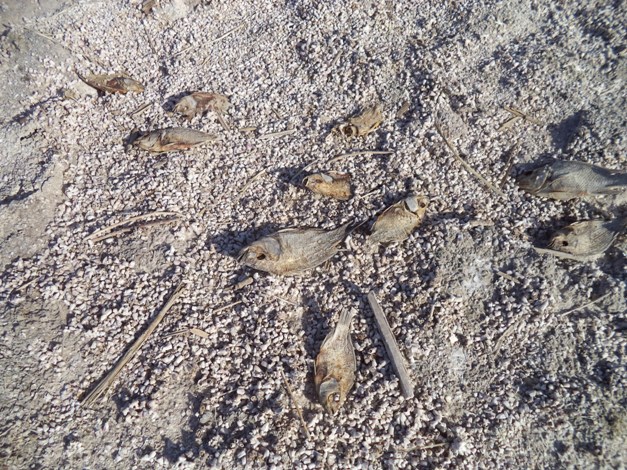
Last month, I was standing on a beach in California.
To my dismay, I was not amid tanned bodies walking along the beautiful shoreline or surfers rushing into the waves. I was not cracking open a beer and lighting a bonfire as the sun went down. I wasn’t having the typical Californian experience.
But it still took my breath away.
In the middle of the desert, about an hour from Mexico, I was standing on the shores of a giant lake called the Salton Sea. Maybe you’ve heard of it? The Divine Fits wrote a song about it, and Frank Sinatra famously docked his yacht at the Sea’s boat club.
On my way out to the Salton Sea, driving through the scorching heat in my shiny new rental car, I couldn’t help feeling out of place. I cranked up the air conditioning and cursed myself for yielding to the mal-adaptations of our modern age. When I got to the mostly abandoned trailer park near the shore, I took the time to pretend I was in a scene from a Mad Max movie.
Over the millennia various water bodies have occupied this geographic depression in the south east corner of the Golden State. Most recently, the Salton Sea was accidentally created when a turn of the century engineering feat failed and water from the mighty Colorado River gushed into California to create an expanse of fresh water of over 300 square miles.
Today the Salton Sea is maintained by an underground aquifer sustained by nearby agricultural water drainage. In California, farming accounts for around 80 percent of consumptive uses, so historically there has been plenty of water for the Sea. But this is changing, slowly and surely, as farmers increase the efficiency of their operations or transfer part of their water to municipalities to meet the demands of growing populations.
Overall, this is a great thing. Water efficient farming is a vital climate change adaptation, and securing potable water supplies for cities is crucial for urban planning.
But as farmers become more efficient and urban demands grow, less water is percolating through the parched ground to recharge the acquirer that has maintained the once majestic Salton Sea. As a result, the Sea is shrinking and salinity is spiking. All at an alarming rate.
Sand and silt that was previously covered by cool, clear water is now exposed to the scorching sun. Fish carcases pile up in mounds and bones make crunching sounds as I try to tread lightly around the old tires and lost shoes.
This is the beach I stood on in California: Dead Fish Beach.
It was hot. And it was smelly.
I walked to edge of the lake and tasted the lukewarm water. It was meant to be fresh. I imagine if someone were to taste the sweat pouring off of my face, it would taste something like the water that lapped at my feet. It was not fresh.
No, this wasn’t the typical Californian experience. But it still took my breath away.
Turning away from the lake, I wondered if it was the potent smell of rotting fish or my own dismay that made my eyes water.
Walking back to the car, I tread less carefully over the dead fish than I did going down to the shore. I got back in my aluminum and glass bubble. I turned the air conditioning on. I thought about getting an iced latte at Starbucks on the way home.
Safe and sound in my shiny rental car I couldn’t smell the rotting fish. I couldn’t hear the crush of their bones under my sandals or feel the prick of their dried out scales on my exposed toes. I couldn’t feel the blistering sun bake my skin.
I couldn’t hear it, see it, feel it. Yet it was only a few meters away from my air conditioned comfort. I had discovered the physical equivalent of quickly scrolling past a particularly poignant humanitarian issue on your news feed when you are feeling fragile. It’s too much, just keep scrolling, just get back in the car.
As I drove back to the city the complexity of the situation plagued my thoughts. Shared dependence on scarce freshwater supplies can cause fierce competition between farmers and the environment. In the case of the Salton Sea, it has made them unlikely allies.
I skipped that iced latte at Starbucks on my way home. And in the hours I spent driving I realized something: siting in lecture halls on campus, riding the trolley in San Diego, or walking up Hollywood Boulevard in Los Angeles, we are all a part of this whether we like it or not. We might not be able to see it, smell it, or taste the salty-brackish water, but we are a part of it. In most cases, it is for us that the water is being transferred. It is being transferred so we can continue to cultivate lush ferns, to take long showers, to have large families and to let our rainwater run down the drain.
In the cities, in our cars, on our news feeds: we might not be able to smell the dead fish, but it doesn’t mean it’s not out there rotting. Sometimes it helps widen our perspective to go step on the bones.
Relephant:
California to Run Out of Water in One Year: Water Restrictions Imposed.
Author: Claire Settre
Editor: Catherine Monkman
Photos: Author’s Own






Read 1 comment and reply